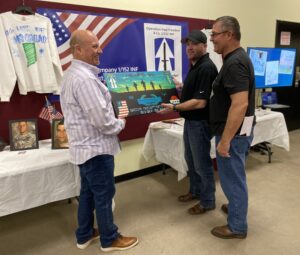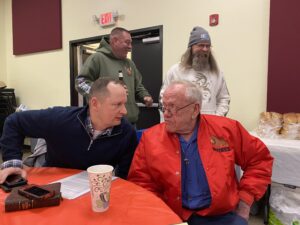By Sherri Coner
To celebrate the 20th anniversary of their return from Operation Iraqi Freedom, members of B co. 1-152nd Infantry Battalion and their families recently gathered at Greenwood VFW Post 5864.
Until the 2003 deployment of these 120+ Hoosier soldiers, 50 years had passed since the National Guard was last deployed to combat.
“We did not know what our mission was until we were in the air,” said SSG Russell Glowner of the Southside.
When Vietnam veteran and National Guardsman Sgt. Daniel Fletcher of Linton, Ind. learned that his sons were being deployed, he made a quick decision.
“I had already been there and done that,” Fletcher said of his combat experience. “If I could help get my boys home, I wasn’t letting them go without me. I was 55 years old when I went to Iraq.”
Fletcher’s younger son, Adam Fletcher of Bedford, Ind. was reassigned to a support element at Camp Atterbury.
In early February 2003, Fletcher’s older son and Platoon Commander Brian Fletcher of French Lick, Ind. was on the plane with his dad and more than 100 other soldiers headed for the Middle East.
The first stop was Doha, Kuwait, where they trained for chemical warfare, crawling through the sand in 100 + degrees while wearing full protective gear.
The guardsmen then traveled to Ali Al Air Base in Kuwait, “to provide force protection for Forward Operating Base 53,” said Col. Danny Bell of Spencer, Ind., who served as commander.
“At first we didn’t know if Sadam had scud missiles,” said Platoon Leader Kyle Baer of West Lafayette, Ind. “Scuds were shot toward us, but they were intercepted.”

On a hot March night, the men boarded a C-130 bound for Baghdad.
“It was pitch black and 190 degrees inside,” Glowner said of the high-security decision for the two-hour flight to be made in total darkness.
“It was jam-packed with men but dead silent,” Glowner said. “We knew what we were all thinking.”
“We were like the second or third plane to land in Baghdad,” Baer said of what was known then as Saddam International Airport.
After exiting the plane in the dark, “moving people safely from the airport to a palace complex” was the initial mission, Baer said.
To complete that task, “We commandeered a dump truck, a catering truck and a bus to get to the complex,” Glowner said.
“In Baghdad, we slept in blown up buildings, in an area that provided security,” Baer said. “Then we moved to the palace where the headquarters was.”
“We were over there so early, there were no facilities set up,” Glowner said. “We were sent in to secure the area not to rebuild.”
Each day, meals consisted of one MRE and a bottle of water.
“I went over there at 180,” said Baer. “I came back weighing 135.”

background on left: Cory Drake and Michael Hacker, both of Martinsville, Ind.
In Iraq, Fletcher saw his older son only once. “Death row was between my son and me,” Fletcher said of their separate locations. “On that strip of about 20 miles, there were booby traps, ambushes and mortar fire. We were in a state of alarm the whole time we were there.”
When soldiers trained in Kuwait, email and sporadic calls back to Indiana were possible.
All contact stopped when the guardsmen moved into Baghdad.
“We were constantly on our cell phones,” said Anita Green of Indianapolis, whose son Cpl. James “JC” Cleveland II of Gosport, Ind. was 24 at the time.
“The news would come on, saying that another soldier was dead, and we didn’t know where any of our guys were; it was awful,’” said Jill Underwood of Martinsville, Ind., wife of Staff Sgt. Carl Underwood.
Teary eyed, Debbie Weber of Center Grove mentioned her son, Sgt. David Weber of Morgantown, calling once in the middle of the night.
“He said, ‘Mom, I can’t call you much. When I do, I get weak, and I have to stay strong for the guys.’”
All the guardsmen agreed that experiencing extreme fear but tapping into an equally extreme amount of courage tends to change a person.
SSG Glowner explained it this way, “Anybody can do anything when they have no other choice. People are depending on you.”

